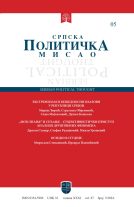- Насловна
- Истраживачи
- Марко Миленковић
Марко Миленковић
Институт друштвених наука, Београд

EUROPEAN UNION COMPETENCES IN THE AREA OF COMMUNICABLE DISEASES – EXPERIENCES AND LESSONS LEARNED FROM THE COVID-19 CRISIS
In the European Union, healthcare and public health are mostly within the competence of Member States. Still, in a number of sub-domains, coordination between Member States led to the adoption of legislation that formed the healthcare acquis, together with a whole set of programs and initiatives aimed at improving public health within the Union. The European Centre for Disease Prevention and Control (ECDC) was formed in 2004 to help EU institutions and Member States identify and assess the risk of current and emerging threats to human health from communicable diseases. At the end of July 2020, Member States reached a general agreement on the recovery plan, but the final agreement had not been adopted by the end of the year. On the other hand, in the spring of 2020, EU launched a global action for universal access to tests, treatments and vaccines against coronavirus and for global recovery, while in October 2020, it presented the strategies on vaccine allocation and additional Covid-19 response measures. In November 2020, a new framework was proposed for the improvement of the response to cross-border health threats, as well as for the expansion of the role of EU agencies – ECDC and the European Medicines Agency, related to coordination of preparedness measures and response to public health threats. This initiative came within a wider proposal entitled “European Health Union”. Hence, soon after the crisis broke out, different initiatives were launched to improve the institutional system for communicable disease control in Europe and assistance provided to the Member States. Still, these changes remain within the framework prescribed in the contracts and keep the responsibility, for the most part, at the level of Member States with the possibility of EU assisting, coordinating and helping the Member States in the situations that exceed their capacities; they also emphasize that the main role of the Union can and should be in the field of economic assistance, which is what the unique proposed assistance package has shown.

Electoral Management in the Western Balkans – Overview of Institutional Setting
Countries of the Western Balkans (WB) – former federal units of Socialist Federal Republic of Yugoslavia and Albania have undergone a lengthy and complex process of democratisation from late 1980s. Free and fair elections are among the cornerstones of democratic consolidation. Even though the institutional setting for electoral management differs greatly across the globe, during the Europeanisation process it was widely recommended to transitional societies to set up independent electoral management bodies in other to guarantee fair electoral conditions, with standards mostly promoted by the Venice Commission of the Council of Europe (VC) and International Institute for Democracy and Electoral Assistance (IDEA). Based on this influence, all the countries of the WB have established electoral commissions that are to great extent formally independent from the executive, with the intention of being less prone to electoral meddling. This is enhanced by regular election monitoring in the region by the Organisation for Security and Cooperation in Europe (OSCE) and the process being followed and evaluated by both the European Union institutions and member states as part of fulfilment of the Copenhagen criteria to join the EU. This paper gives an overview of the institutional setting of electoral management in the WB that was created following the model of independent bodies and outlines main features of their design.
